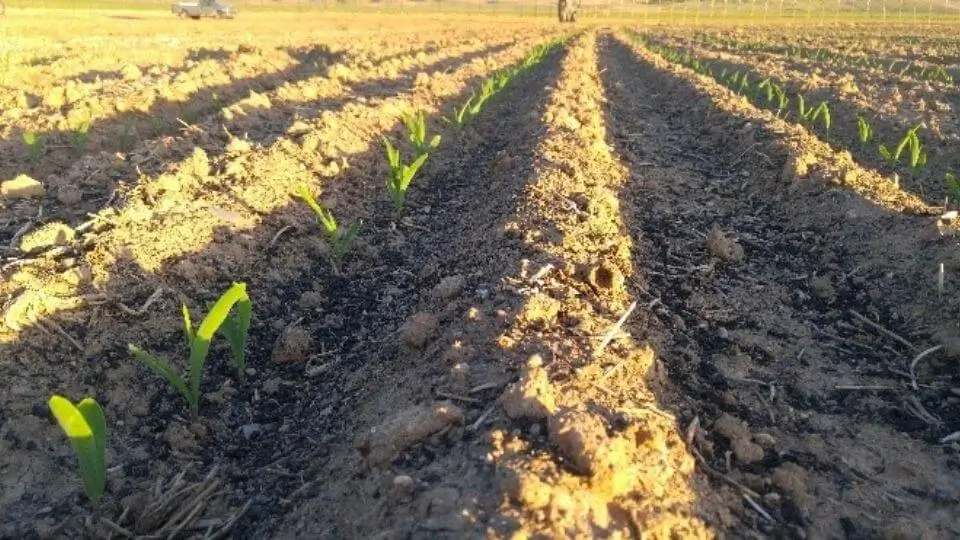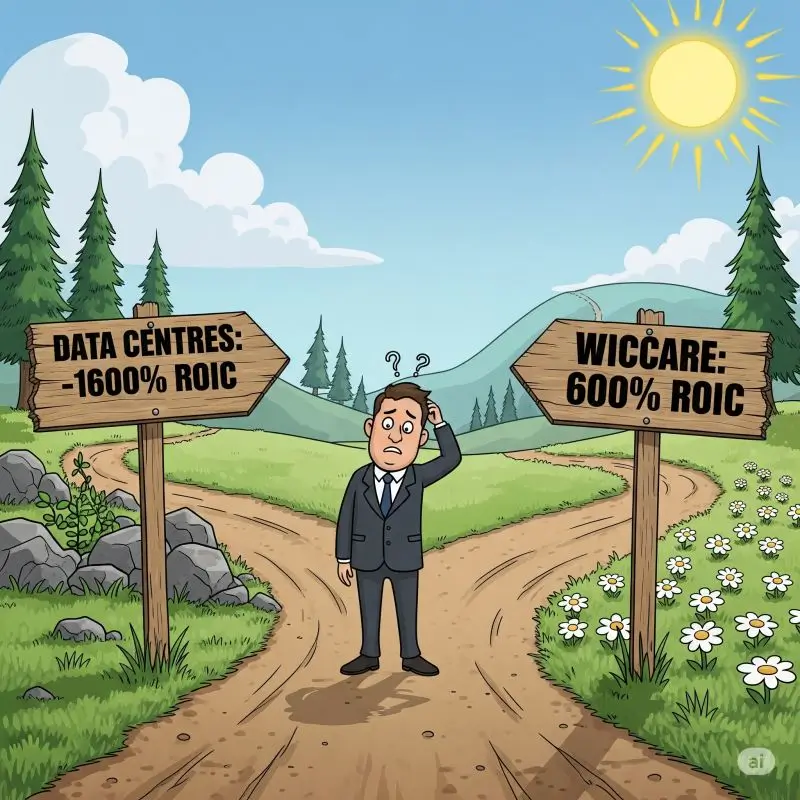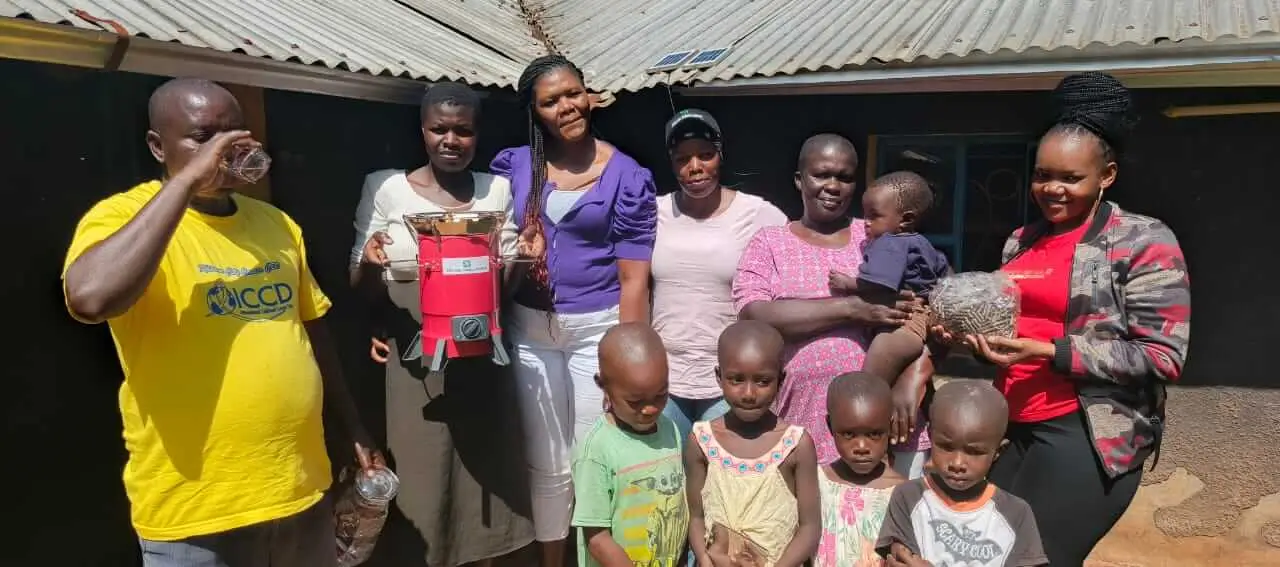Explore our perspectives on sustainable agriculture, clean energy, and climate resilience.
 By Joel Nyakwaka | Date: 21 July 2025
By Joel Nyakwaka | Date: 21 July 2025
For a long time, our communities, whether in small scale or large scale, have heavily depended on chemical fertilizers in their farms for high yields. While the effects of these have been visible in terms of high produce, particularly in the early years of usage, the long-term impact on the soil fertility has been undeniably visible.
Intensive use of inorganic fertilizers tends to erode soil value over time, leaving farmers with farms that can barely yield any significant output. The impact of this declining soil fertility is reducing productivity, exposing households and communities to food insecurity. More than ever before, our communities face the threat of hunger due to poor crop yields, raising the question: what sustainable solutions are available to help farmers overcome this challenge? Biochar is one such solution.
So, what is Biochar?
Biochar is a stable, porous substance created by heating organic materials in a low-oxygen environment. It improves soil health, retains water, enhances microbial activity, and most importantly, stores carbon in the soil for hundreds of years — helping farmers fight both food insecurity and climate change.
What are some of the benefits biochar is offering to farmers?
Biochar enhances soil fertility, which in turn improves productivity: According to a study by the Agronomy for Sustainable Development ,the addition of biochar into the soil is a solution to soil erosion and nutrient leaching, helping improve soil fertility, enhance crop yield, and promote plant growth. The report also highlighted how the use of biochar enhances soil structure, improves water retention, and supports nutrients development through the created environment for microbial activities, boosting farm productivity.
Beyond the agricultural space, biochar is a valuable product for use in decarbonizing the built environment. It is useful in creating carbon-negative materials in packaging and construction. From these benefits, biochar is an antidote to sustainable farming practices, particularly in Africa that is agriculture-reliant as a source of livelihoods for many households. While the effectiveness of biochar in achieving these has been tested, most parts of Africa are still lagging behind in embracing the new alternative to enjoy its full benefits.
WICCARE Africa Limited is stepping up to bridge this gap through its operations in Suna West Sub-County, Migori County, Kenya. As a pioneering social enterprise in the clean energy and circularity space, the company is processing biomass from agricultural wastes to make biochar for local use, directly addressing the issues of farm productivity and climate change, whose effects are visible in that part of the world. WICCARE through its biochar will make households self-sufficient with the increased crop yield. The innovative response to climate change also promises Migori County as a sustainable future where generations to come can thrive.
 By Alex Keane | Date: 8 August 2025
By Alex Keane | Date: 8 August 2025
You've likely read the headlines. A tidal wave of capital is flooding into the "next big thing"—AI data centres. We've seen this film before. The dot-com fibre build-out, the shale oil boom... history teaches us that a headlong rush into infrastructure without a clear path to profitability results in one thing: incinerated capital.
The arithmetic is simple and brutal. As a recent article by the always entertaining Kuppy of Praetorian Capital points out, an estimated $400 billion will be spent on new data centres in 2025 alone. The annual depreciation on that capital —some $40 billion—is twice the projected revenue. To even break even, revenue would need to be 10x to a staggering $160 billion. And that calculation assumes the infrastructure spending doesn't continue or accelerate in 2026! This is a financial black hole.
And yet, investors are stampeding towards it, fuelled by FOMO in a winner-takes-all race to AGI (I think). This leaves a massive gap. While capital is being poured into ventures condemned to deeply negative returns on invested capital (ROIC), sectors with high margins, ready demand, and deeply positive ROIC are starved of funding.
Like Kuppy, I recognise that AI is amazing and has world-changing use cases, just as the internet backbone and shale oil infrastructure have had. But that didn't stop most of the investors who funded them from losing almost everything.
At WICCARE Africa, we operate in one of those "unfashionable" sectors. We take what others discard—agricultural and municipal waste—and transform it into products that are urgently needed: clean energy, organic fertilisers, and durable carbon sequestration.
High Margins: We turn a negative-value input (waste) into positive-value outputs. Our feedstock is often free, and our products command decent prices due to local demand for sustainable alternatives to charcoal, fossil fuels, and synthetic fertilisers. The demand is here, now, and growing rapidly.
Positive ROIC: Our returns on capital are not a distant, theoretical possibility. Every dollar invested in building a WICCARE Hub generates immediate and tangible value, economically, environmentally and socially.
The Reverse Stampede
So, to all the investors out there scrambling to burn hundreds of billions on a speculative bet, we have a challenge: stop the stampede to nowhere. Instead, consider a reverse stampede to the "next-next-big-thing"—to the sectors with strong fundamentals that are currently being overlooked. The prize isn't a nihilistic AI zero-sum game; it's real cashflow, high margins, and a tangible impact on the world.
Don't bet on a rerun of the last bubble. Join us in building a new kind of economy, one briquette, one pellet, one carbon removal credit at a time. It's not as flashy as a new data centre, but the returns are a lot more real.
 By Joel Nyakwaka | Date: 15 May 2025
By Joel Nyakwaka | Date: 15 May 2025
Migori County, like many others in Kenya, faces serious climate change risks due to long-standing traditional practices such as reliance on firewood and chemical fertilizers. These practices have contributed to forest loss, soil degradation, and carbon emissions.
According to Global Forest Watch, Migori county had 839 ha of natural forest in 2020, representing about 0.26% of the land area. However, by 2023, the county had lost 11 ha of its natural forest, representing 5.26kt of CO2 emissions. Over the last two decades, the county has lost 1.20 kha of tree cover, which is equivalent to an 8.2% decrease in tree cover. The declining tree cover is a reflection of the continued use of firewood, both at the household and industrial levels for cooking.
As forest cover declines and carbon emissions increase, households are increasingly becoming vulnerable to food insecurity. Unpredictable weather patterns due to climate change could lead to a significant decline to farm yields, for communities that are heavily dependent on farming, exposing the already suffering communities to more nutrition problems. It calls for the national and local government to support innovative initiatives designed to arrest climate change and develop sustainable agriculture and clean energy projects. Undoubtedly, green projects are an antidote to climate change as they promote renewable energy and improve energy efficiency in our communities.
Women in Cold Chain Agriculture and Renewable Energy (WICCARE) Africa Limited is a one of such pioneering social enterprises in the region that is coming up with projects designed to curb carbon emissions and encourage use of renewable energy at the household and industrial levels. Through its pioneering project in the county, the company is coming up with clean energy products designed to make our kitchens and industries free from carbon emissions. Its innovative products – biomass pellets and briquettes – will be a reprieve to many households who are already experiencing the wrath of carbon emissions.
Away from clean energy products, WICCARE also develops biochar - a stable, porous substance made from subjecting organic materials to low-oxygen heating – that will not only sequestrate carbon from the atmosphere and store it for thousands for years, but also boost farm yields. This will make many communities in the county self-reliant.
This is a call to action for Migori’s leadership to support green innovation and scale up such impactful solutions.
WICCARE is committed to transforming agriculture and energy in rural Africa. Join us in scaling clean, circular, and climate-resilient solutions.
Get in Touch